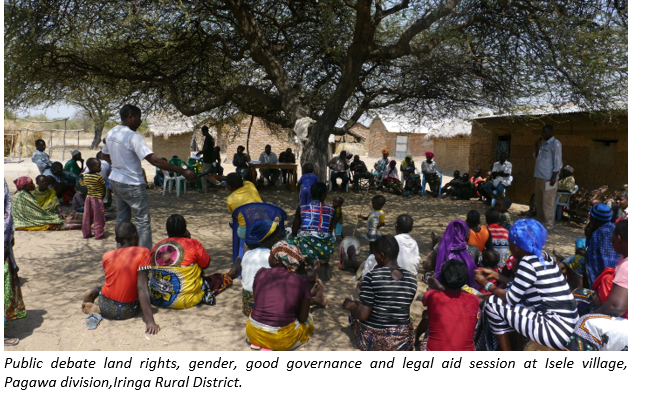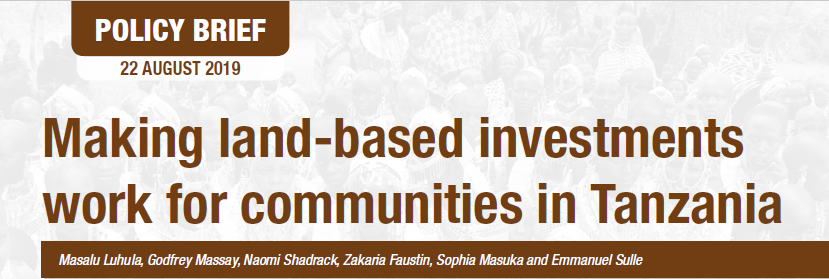PUBLIC DEBATE AND LEGAL AID IN IRINGA
lllllllllllllllllllllllllllllllllllllllllllll.png

Tanzania Natural Resource Forum (TNRF) in collaboration with the Iringa rural District Council conducted a four days public debate and legal aid sessions on land governance in four villages of Pawaga division, Iringa rural district. The villages include: Itunundu, Kisanga, Isele and Mboliboli from 20th to 23th August, 2018. This activity aimed at enhancing community knowledge on land rights and facilitate access to justice. This is a three year project on Land Governance and Accountability funded by Welthaus Graz and DKA both based in Austria and is being implemented in Iringa and Dodoma regions.
The debate involved all community members (men and women) and their leaders on issues related to land laws, women land rights, land dispute resolution mechanisms, and local governance system. The current land laws in Tanzania: Land Act No. 4 of 1999 and Village land Act No 5 of 1999 gives power to the community on administration, utilization and management of village land and its resources for sustainable development. Also the legal system provide for different mechanisms of land conflict resolutions which include village land council, Ward Tribunal, District Land and Housing Tribunal(s), High Court and Court of Appeal. These mechanisms differ and interrelate depending on the magnitude and nature of conflicts, value of land under dispute and the right of a complainant to appeal to the next level. In terms of women land rights, the discussion touched on their rights to land ownership, right to have shareover matrimonial properties in case of divorce or long term separation and right to inherit properties upon death . For effective administration at village level, the discussion also involved the leadership and governance structures which include the Village Assembly, Village Councils, village government committees; their roles and responsibilities, tenure in office and qualifications of office bearers.
From the public debate and legal aid sessions, the following were some of the issues raised by the communities:
- Boundary conflicts i.e. between Kisanga and Kimande village. It was said by the villagers, the process of Land Use Planning that was undertaken by the District has shifted the boundaries, where some of plots which used to be in the village were identified to be in Kimande village. This has caused conflict and the village calls for intervention of the district to recognize the initial boundaries put during the registration of the village.
- Clear roles and cost of solving land related conflicts by the village land committees Villagers in Itunundu, Isele and Kisanga village were concerned with the role of the village Land Council, where in their views, the Village Land Council should be given power to determine cases on merits. This is for the reason that, they are conversant of the areas in the village and hence capable of doing just.
- Circumstances under which divorce happens and the criteria used to divide family properties should consider properties acquired before marriage not to be included in the distribution-Isele village
- Criteria used for village land allocation- The village designated land for pastoral activities, forest reserve and for future use. There are people from the village who have invade this land for their own use without due process. Kisanga village
Leadership wrangles in Mbugani villag. The debate in Mboliboli brought people from two villages which close. people from Mbugani attended the debate with concern of their village chairman being removed in power without any good course. The chairman was one of their man of the soil who they still want to be the leader. The villagers accused the Mboliboli Ward councilor to be behind the movement for his own interest. The Chairman was expelled from his part Chama Cha Mapinduzi (CCM). TNRF through this project will continue to empower communities especially women on land rights and governance for sustainable development.

